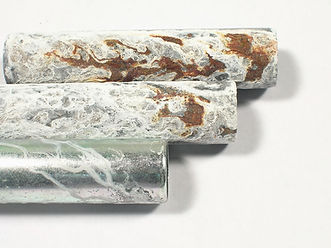Testing Highlight: Scribes
- mvermeulen89
- May 15, 2024
- 2 min read
Scribes and Why They Are Used

A scribe is an intentionally placed, linear cut in a coating on a sample that will be exposed to an accelerated corrosion test. Many different standard test methods utilize scribes as evaluation criteria for corrosion testing. Modern coating technologies are extremely robust and can provide excellent corrosion resistance. By adding an intentional area of damage in the form of a scribe, coating developers and their end users can more realistically evaluate coating performance.
How Scribes Are Performed
Scribing involves cutting into the coating with a scribing tool, and creating a cut that penetrates the coating to the substrate. This can be done on test panels or parts, provided there is adequate flat surface on the part. Various types of manual and automated scribing tools are utilized depending on the test standard. Some common tools are razor knife, rotary cutting tool, or pencil like tools with a sharp, specially pointed tip. The tip shape and size varies by test standard. The scribing tool is usually used in conjunction with a straight edge to cut a straight line of a specified length. A number of common line configurations for scribes are used: straight line, X-scribe or V-scribe.
Evaluation of Coating Performance

After exposure of the panels or parts to the corrosion test, evaluation for corrosion creepage, or undercutting, is normally performed. There are various methods for this, but it generally involves measuring the distance perpendicular to the scribe that corrosion has spread away from the scribe. To do this, the coating around the scribe must be removed. This can be done by scraping with a spatula or knife, applying compressed air or pressurized water, or by chemical stripping methods. Once this has been removed, measurements of the corroded area can be made using calipers or a ruler.

Common Test Methods for Performing Scribes
ASTM D1654 Standard Test Method for Evaluation of Painted or Coated Specimens Subjected to Corrosive Environments
ISO 17872 Paints and varnishes – Guidelines for the introduction
of scribe marks through coatings on metallic panels
for corrosion testing (ISO 17872:2019)
ISO 4628-8 Assessment of degree of delamination and corrosion around a scribe or other artificial defect



Comments